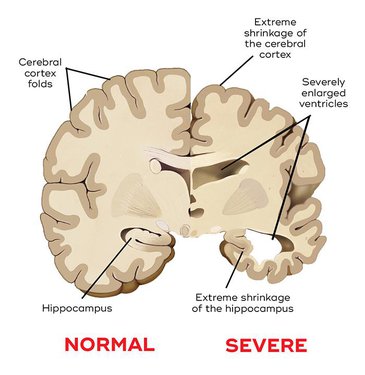
If you're unsure about the difference between dementia and Alzheimer's disease, you're not alone. Each month, Google receives thousands of searches from people looking for answers to this question, often because they have a loved one exhibiting symptoms of memory loss.
So...what is the difference between Dementia & Alzheimer’s?
Dementia is an umbrella term used to describe a set of symptoms, most commonly, memory loss and reduced cognitive function.
Alzheimer's disease is a specific type of dementia, and the most common type. In fact, 62% of people diagnosed with dementia are diagnosed with Alzheimer's disease. While some forms of dementia are reversible, Alzheimer's is not.
Understanding the difference between dementia and Alzheimer's can be confusing, so throughout this article, we look deeper into the different types and differences between Dementia & Alzheimer's.
What are the symptoms of Dementia?
Early symptoms of Dementia can be easily overlooked due to the fact that they are often only mild. These symptoms can consist of the following:
- Becoming lost in a familiar setting
- Struggling to keep track of the time
- Having episodes of forgetfulness
The forgetfulness and confusion grow as Dementia advances, as well as a person’s ability to take care of themselves. It is not uncommon for a person suffering from Dementia to develop challenging behaviours such as verbal and physical aggression over time.
Are the symptoms of Alzheimer’s any different?
Many of the symptoms of Alzheimer’s Disease coincide with those of Dementia, which contributes to people’s difficulty in distinguishing between the two.
Common signs of Alzheimer’s Disease include:
- Impaired judgment
- Behaviour changes
- Difficulty remembering recent conversations or events
- Depression
- Disorientation
What causes Alzheimer’s Disease?
Alzheimer’s disease is caused by a particular group of brain cells becoming damaged. The damage to these brain cells occurs years before any of the symptoms develop. Abnormal protein deposits form plaques and tangles in the brain, which lead to the connections between brain cells becoming lost, and they begin to die.
As you can see from the image to the right, the loss and death of connections between brain cells cause significant shrinkage of the brain.

Is it possible for younger people to get Dementia or Alzheimer’s Disease?
As we age, our risk of contracting dementia heightens. However, although not as common, it is still possible for younger people to develop the syndrome. This is known as early-onset dementia.
Symptoms of Alzheimer's disease, in most cases, begin after a person turns 60 years old. Similar to dementia, younger people can also develop the disease. For people over the age of 80, the time from diagnosis to death can be as little as 3 years. On the other hand, younger sufferers can live with the disease for a lot longer.
Can anything be done to slow or prevent dementia?
Dementia can be treated by treating the condition that is causing dementia. The treatment depends on the exact cause and type of dementia the individual has. A lot of the treatments for dementia overlap with the ones used for Alzheimer's disease.
Alzheimer’s disease is treated through medication to relieve the symptoms. Medications prescribed to alleviate symptoms of Alzheimer's disease help improve: sleep, depression, memory loss and behavioural changes.
Research suggests that oral turmeric supplements may help to prevent dementia & Alzheimer's disease. Curcuminoids help reduce beta-amyloid plaque buildup in the brain and decrease neuroinflammation, both of which are associated with Alzheimer's disease development.
Did you know that some forms of dementia are reversible but Alzheimer’s is not?
Dementia can be reversible, or even temporary in some cases, but only if the cause was due to drugs, hormone or vitamin imbalances, depression, or alcohol. However, Alzheimer's is unfortunately irreversible and permanent at this time.
What different types of dementia are there?
To further clarify the difference between dementia and Alzheimer's, it's helpful to know that there are various types of dementia, with Alzheimer's being the most prevalent.
Alzheimer's disease - This is the most common type of dementia, accounting for 60-80% of cases. It is characterised by the buildup of abnormal proteins in the brain, leading to the death of brain cells. Symptoms typically begin with mild memory loss and progress to include difficulty with language, problem-solving, and thinking.
Frontotemporal dementia - This type of dementia affects the frontal and temporal lobes of the brain, which control behaviour, personality, and language. Symptoms often include changes in personality, behaviour, and language, as well as difficulty with planning and decision-making.
Vascular dementia - This is the second most common type of dementia, caused by reduced blood flow to the brain. This can be due to a stroke, a series of mini-strokes, or other conditions that damage blood vessels. Symptoms can vary depending on the area of the brain affected, but often include problems with memory, thinking, and reasoning.
Lewy body dementia - This type of dementia is characterised by the presence of abnormal protein deposits called Lewy bodies in the brain. 1 These deposits affect chemicals in the brain, leading to problems with thinking, memory, movement, and behaviour. People with Lewy body dementia may experience visual hallucinations and fluctuations in their alertness.
Mixed dementia - This term is used when someone has more than one type of dementia. A common combination is Alzheimer's disease and vascular dementia. Symptoms will vary depending on the types of dementia present.
Recognising the difference between dementia and Alzheimer's empowers individuals to seek appropriate support and care.
Need help looking for dementia care?
Get in touch with TrustedCare's specialist Advisers for free help & support to shortlist services.
Call us on 01865 638018
Send message

